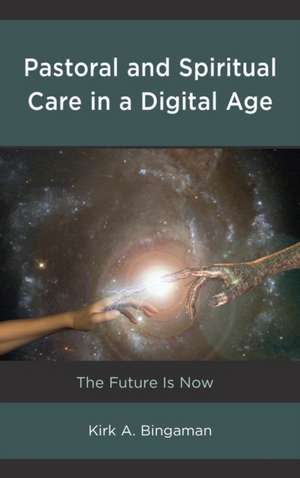Pastoral and Spiritual Care in a Digital Age: Emerging Perspectives in Pastoral Theology and Care
Autor Kirk A. Bingamanen Limba Engleză Hardback – 14 oct 2018
Din seria Emerging Perspectives in Pastoral Theology and Care
- 19%
 Preț: 531.03 lei
Preț: 531.03 lei - 23%
 Preț: 603.33 lei
Preț: 603.33 lei - 5%
 Preț: 845.82 lei
Preț: 845.82 lei - 23%
 Preț: 685.85 lei
Preț: 685.85 lei - 23%
 Preț: 688.37 lei
Preț: 688.37 lei -
 Preț: 325.13 lei
Preț: 325.13 lei - 5%
 Preț: 350.54 lei
Preț: 350.54 lei - 5%
 Preț: 328.42 lei
Preț: 328.42 lei - 23%
 Preț: 556.61 lei
Preț: 556.61 lei - 23%
 Preț: 616.83 lei
Preț: 616.83 lei -
 Preț: 347.03 lei
Preț: 347.03 lei - 23%
 Preț: 589.13 lei
Preț: 589.13 lei - 23%
 Preț: 589.24 lei
Preț: 589.24 lei - 23%
 Preț: 648.64 lei
Preț: 648.64 lei -
 Preț: 307.00 lei
Preț: 307.00 lei - 32%
 Preț: 450.65 lei
Preț: 450.65 lei
Preț: 797.72 lei
Preț vechi: 839.71 lei
-5% Nou
Puncte Express: 1197
Preț estimativ în valută:
152.65€ • 159.91$ • 126.51£
152.65€ • 159.91$ • 126.51£
Carte tipărită la comandă
Livrare economică 08-22 aprilie
Preluare comenzi: 021 569.72.76
Specificații
ISBN-13: 9781498553414
ISBN-10: 1498553419
Pagini: 154
Dimensiuni: 152 x 229 x 18 mm
Greutate: 0.36 kg
Editura: Rowman & Littlefield
Seria Emerging Perspectives in Pastoral Theology and Care
ISBN-10: 1498553419
Pagini: 154
Dimensiuni: 152 x 229 x 18 mm
Greutate: 0.36 kg
Editura: Rowman & Littlefield
Seria Emerging Perspectives in Pastoral Theology and Care
Notă biografică
Kirk A. Bingaman is associate professor of pastoral care and counseling at Fordham University.
Cuprins
1 The Rapid Advance and Proliferation of Digital Technologies
2 Theological Narratives of Hope and Apprehension
3 Human Nature and Technological Enhancement
4 Maintaining Our Attentional Control
5 Elevating Contemplative-Meditational Practice
6 A Mindfulness-Informed Framework and Approach
Descriere
Digital technologies and the advance of artificial intelligence are changing human nature. This book explores implications for pastoral and spiritual care providers, religious faith communities, clinical practitioners, and educators and asserts the need for theological reflection about both the existential risk and the opportunities of this change.
